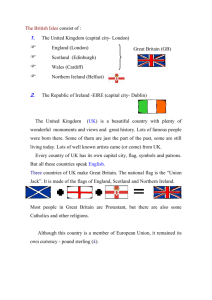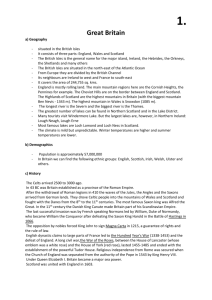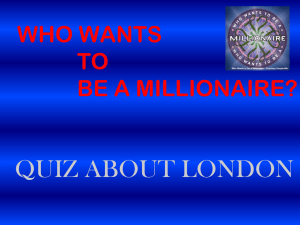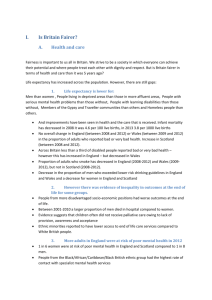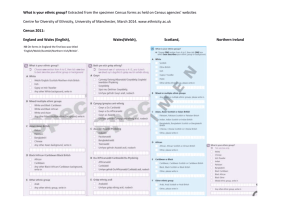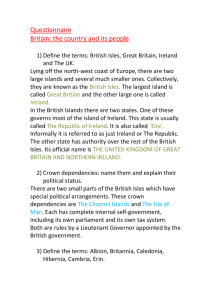The UK: Culture, Education, and Daily Life Presentation
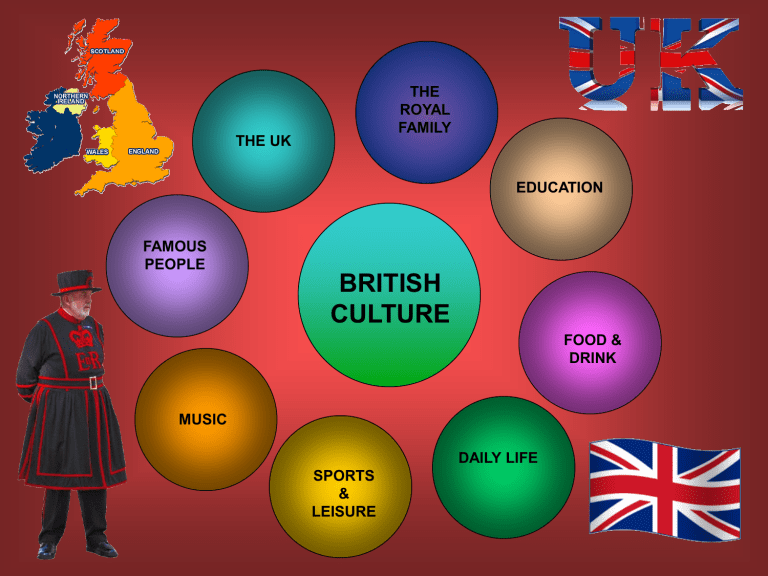
BRITISH
CULTURE
THE UK
The Union Flag
(The Union Jack)
Great Britain is the official name given to the two kingdoms of England and
Scotland, and the principality of
Wales.
It is an island lying off the western coast of Europe
The official name is the United Kingdom of Great Britain and Northern
Ireland
It is made up of the individual Flags of three of the Kingdom's countries all united under one Sovereign - the countries of England, Scotland and
Northern Ireland (only since 1921). As
Wales was not a Kingdom but a
Principality it could not be included on the flag
The cross of
St Andrew,
Scotland
The cross of
St Patrick,
Ireland
The cross of
St George,
England
ICONS OF LONDON
Can you identify them?
1
St Paul’s Cathedral
2
Buckingham Palace
3
Double Decker Bus
4
Beefeater
11
5
The Tower of London
Tower Bridge
7
Telephone kiosk
8
Royal Guardsmen
6
The Houses of Parliament and the Big Ben
10
Policemen/Bobbies
9
Red Post Box
England
Map
Flag
National symbols
Capital city
COUNTRIES
Wales
Map
Flag
National symbols
Capital city
Scotland
Map
Flag
National symbols
Capital city
Northern Ireland
Map
Flag
National symbols
Capital city
ENGLAND
England is in the southern part of Great Britain.
St. George is the patron saint of England.
His emblem, a red cross on a white background, is the flag of England, and part of the British flag.
The national flower of
England is the rose .
Cross of St George
St George's emblem was adopted by Richard The
Lion Heart and brought to
England in the 12th century.
The king's soldiers wore it on their tunics to avoid confusion in battle
London is the capital city of England.
St. George's Day is on 23
April .
It is England's national day
SCOTLAND
Scotland is a mountainous country in the north of the island of
Great Britain
Scotland has some 790 islands - 130 inhabited
Cross of St. Andrew
(the Saltire)
The national flower of
Scotland is the thistle , a prickly-leaved purple flower
The Scottish Bluebell is also seen as the flower of Scotland
Edinburgh is the capital city of Scotland
St Andrew is the patron saint of Scotland
St Andrew's Day is on 30 November
WALES
Wales ( Cymru in Welsh) is a mountainous country on the western side of Great Britain
The flag of St David
Cardiff is the capital city of
Wales
The most famous story about Saint David tells how he was preaching to a huge crowd and the ground is said to have risen up, so that he was standing on a hill and everyone had a better chance of hearing him
The national flower of Wales is the daffodil.
The leek is also considered to be a traditional emblem of Wales
St David's Day is on 1 March
NORTHERN IRELAND
Northern Ireland lies in the northeast of the island of Ireland
The flag of St Patrick
The most famous story about Saint
Patrick is him driving the snakes from
Ireland
Saint Patrick is the patron saint of Ireland.
He is credited with bringing Christianity to
Ireland Belfast is the capital city of
Northern Ireland
The national flower of
An Irish tale tells of how Patrick used the three-leafed shamrock to explain the Trinity.
He used it in his sermons to represent how the Father, the Son, and the Holy Spirit could all exist as separate elements of the same entity
Northern Ireland is the shamrock , a three-leaved plant similar to clover
THE ROYAL FAMILY
On the left, the shield is supported by the English Lion
On the right, it is supported by the
Unicorn of Scotland .
(The unicorn is chained because in mediaeval times a free unicorn was considered a very dangerous beast (only a virgin could tame a unicorn)
The National Anthem is God Save the Queen .
The British National Anthem originated in a patriotic song first performed in 1745. It became known as the National Anthem from the beginning of the nineteenth century.
The full version of the British National Anthem
EDUCATION (I)
Education is free and compulsory for all children between the ages of 5 -16
All government-run schools, state schools, follow the same National Curriculum
The School Year runs from September to July and is 39 weeks long
The main school holidays are:
Christmas- 2 weeks
Spring - 2 weeks
Summer - 6 weeks
There are also one week holidays:
– end of October
– mid February
– end of May
SATs Tests given at the end of each year to show progress
National Tests The name given by the Government to the statutory tests in the Core and Foundation subjects of the National
Curriculum, taken by all children in Local Autrhority schools in
England, Wales and Northern Ireland at the end of Key Stage 1 to 3 (ages 7, 11 and 14 in England and Wales). They are sometimes referred to as “SATs” (Standard Assessment Tasks).
The “
11 Plus
” is a selective examination to determine which children should enter Grammar schools in Year 7.
Almost all British schools require uniforms, whatever the age of the students. The boys carried jacket, shirt and tie. The girls carried blouse, skirt and sometimes tie. As they become older, they will relax the rules on uniform, which in the end is merely a
"dress code"
EDUCATION (II)
State schools : local authority maintained schools. Free to all children between the ages of 5 – 16
– Primary
– Secondary: comprehensive (non-selective) and grammar (selective)
Private/Public schools : Independent schools. Parents pay for their children's education.
– Nursery/Kindergarten 2 to 4 years
– Pre-preparatory 3 or 4 to 7 years
– Preparatory 7 to 11 or 13 years (prepare pupils to go to a public school )
– Public 11 or 13 to 18 years (independent secondary school: Eton, Harrow and
Winchester)
Higher education
Worksheet on
British schools for students to fill in
Breakfast - between 7:00 and 9:00
FOOD
Lunch - between 12:00 and 1:30 p.m.
Some people have their biggest meal in the middle of the day and some have it in the evening, but most people today have a small mid-day meal , called
'packed lunch' . - usually sandwiches, and perhaps some crisps and some fruit
The traditional English breakfast consists of eggs, bacon, sausages, fried bread, baked beans and mushrooms.
The traditional English breakfast is called the 'Full English' and sometimes referred to as 'The Full
English Fry-up'.
Dinner (sometimes called Supper)
– it is the main meal eaten at anytime between 6:30 and
8:00 p.m. (Evening meal)
Sunday lunch time is a typical time to eat the traditional Sunday Roast.
Traditionally it consists of roast meat, (cooked in the oven for about two hours), two different kinds of vegetables and potatoes with a Yorkshire pudding.
DRINK
Tea
Britain is a tea-drinking nation.
Tea in Britain is traditionally brewed in a warmed china teapot, adding one spoonful of tea per person and one for the pot.
The traditional way of making tea is:
• Boil some fresh cold water. (We use an electric kettle to boil water)
• Put some hot water into the teapot to make it warm.
• Pour the water away
• Put one teaspoon of tea-leaves per person, and one extra teaspoon, into the pot.
• Pour boiling water onto the tea.
• Leave for a few minutes.
• Serve
Coffee
Coffee is now as popular in Britain as tea is. Bitter
Britain is also well known for its ale which tends to be dark in appearance and heavier than lager. It is known as "bitter"
Wine
Britain's wine industry is growing from strength to strength and we now have over 300 wine producers. A growing number of British vineyards are now producing sparkling white wine as well as full bodied red wine. There are over 100 vineyard in Kent.
FAMILY LIFE
The family in Britain is changing. The once typical British family headed by two parents has undergone substantial changes during the twentieth century. In particular there has been a rise in the number of single-person households, which increased from 18 to 29 per cent of all households between 1971 and 2002. By the year 2020, it is estimated that there will be more single people than married people. Fifty years ago this would have been socially unacceptable in Britain
What’s the name of these homes?
Detached (a house not joined to another house)
Semi-detached
(two houses joined together)
Terrace (several houses joined together)
Flats
(apartments)
SPORTS
Sports play an important part in the life in Britain and is a popular leisure activity
Many of the world's famous sports began in Britain, including cricket, football, lawn tennis, golf and rugby
England's national sport is cricket although to many people football (soccer) is seen as their national sport
Cricket is played on village greens and in towns/cities on Sundays from April to August
Football the most is undoubtedly popular sport in
England
Rugby originated from Rugby school in Warwickshire. It is similar to football, but played with an oval ball. Players can carry the ball and tackle each other.
Another equestrian sport is polo , brought to Britain from India in the 19th Century by army officers
OTHER SPORTS
What are these sports?
GOLF
TENNIS
HORSERACING
FOX HUNTING
MUSIC
Britain is more famous for pop music than it is for classical composers or jazz musicians. Names such as The Beatles, the Rolling Stones, Queen, Led Zeppelin,
Pink Floyd, Elton John, George Michael and The Spice Girls are known world wide
The Beatles were a rock and pop band from Liverpool, England:
John Lennon (rhythm guitar, vocals), Paul McCartney (bass guitar, vocals), George Harrison
(lead guitar, vocals) and Ringo
Starr (drums, vocals).
What is the title of the song?
Which band plays it?
Queen were a British rock band formed in 1970 in
London by guitarist Brian
May, lead vocalist Freddie
Mercury and drummer
Roger Taylor, with bassist
John Deacon completing the lineup the following year
The Rolling Stones are an English rock band. The band formed in 1962 in London when original leader Brian
Jones and pianist Ian Stewart were joined by vocalist Mick Jagger and guitarist Keith Richards Bassist Bill
Wyman and drummer Charlie Watts completed the early lineup
NOW LISTEN TO THE GROUPS
FAMOUS PEOPLE
William Shakespeare (26
April 1564 – 23 April 1616) was an English poet and playwright, widely regarded as the greatest writer in the
English language and the world's preeminent dramatist. He is often called
England's nationalo poet and the “Bard of Avon" (or simply
"The Bard"). His surviving works consist of 38 plays, 54 sonnet, two long narrative poems, and several other poems. His plays have been translated into every major living language, and are performed more often than those of any other playwright
Sir Winston Leonard
Spencer-Churchill (30
November 1874
– 24
January 1965) was a British politician known chiefly for his leadership of the United
Kingdom during World War
II. He served as Prime
Minister of the United
Kingdom from 1940 to 1945 and again from 1951 to
1955. A noted statesman and orator, Churchill was also an officer in the British
Army, a historian, a Nobel
Prize-winning writer, and an artist
Joanne " Jo " Rowling
(born 31 July 1965), who writes under the pen name
J. K. Rowling , is a British author, best known as the creator of the Harry Potter fantasy series, the idea for which was conceived whilst on a train trip from
Manchester to London in
1990. The Potter books have gained worldwide attention, won multiple awards, and sold more than 400 million copies

